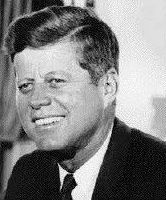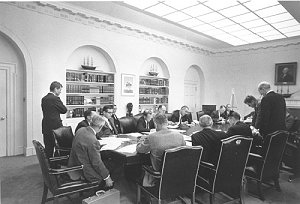John F. Kennedy
From dKosopedia
Categories: Presidents of the United States | Massachusetts Democrats
| John F. Kennedy | |
|---|---|
| President | |

| |
| Party | Democratic |
| January 20, 1961 — November 22, 1963 | |
| Preceded by | Dwight D. Eisenhower |
| Succeeded by | Lyndon Johnson |
| Birthdate | May 29, 1917 |
John Fitzgerald Kennedy (May 29, 1917-November 22, 1963) was the 35th President of the United States of America. A Democrat, he was a member of the Irish-American Kennedy dynasty, and is an icon for American liberals.
During World War II, he was cited for exceptional bravery and heroism while rescuing a fellow sailor in the South Pacific. Kennedy served his home state of Massachusetts in the U.S. Congress during 1947-60, as both a member of the U.S. House of Representatives and U.S. Senate. He was elected President in 1960, in one of the closest elections in American history. John F. Kennedy was the first Roman Catholic President of the United States. The Kennedy administration was also known as Camelot.
Contents |
New Frontier Politics
One of the first presidential acts was the establishment of the Peace Corps on March 1, 1961. The mission of the Peace Corps was to promote a better understanding between Americans and the rest of the world and vice versa by mutually engaging in projects. The program was refered to in his inaugural address with the now famous words: "And so, my fellow Americans: ask not what your country can do for you—ask what you can do for your country" [1]
Civil Rights
In 1954 the U.S. Supreme Court ruled that racial segregation in public schools would no longer be permitted. However, many schools, especially in the southern states, did not obey the Supreme Court's injunction. Segregation on buses, in restaurants, movie theaters, bathrooms, and other public places remained. Kennedy supported racial integration and civil rights, and during the 1960 campaign he telephoned Coretta Scott King; wife of the jailed Reverend Martin Luther King, Jr., which perhaps drew some additional black support to his candidacy.
In 1962, James Meredith tried to enroll at Ole Miss (the University of Mississippi), but he was prevented from doing so by white students. Kennedy responded by sending some 400 Federal Marshals and 3,000 troops to ensure that Meredith could enroll in his first class. Kennedy also assigned federal marshals to protect Freedom Riders.
As President, Kennedy initially believed the grassroots movement for civil rights would only anger many Southern whites and make it even more difficult to pass civil rights laws through Congress, which was dominated by Southern Democrats, and he distanced himself from it. As a result, many civil rights leaders viewed Kennedy as unsupportive of their efforts.
On June 11, 1963, Kennedy intervened when Alabama Governor George Wallace blocked the doorway to the University of Alabama to stop two African American students, Vivian Malone and James Hood, from enrolling. George Wallace moved aside after being confronted by federal marshals, Deputy Attorney General Nicholas Katzenbach, and the Alabama National Guard. That evening Kennedy gave his famous civil rights address on national television and radio. Kennedy proposed what would become the Civil Rights Act of 1964
Space Program
President Kennedy was eager for the United States to lead the way in the space race. Soviet leader Sergei Khrushchev says Kennedy approached his father, Nikita, twice about a "joint venture" in space exploration;in June 1961 and Autumn 1963. On the first occasion, Russia was far ahead of America in terms of space technology. Kennedy first made the goal for landing a man on the Moon in speaking to a Joint Session of Congress on May 25, 1961, saying, "First, I believe that this nation should commit itself to achieving the goal, before this decade is out, of landing a man on the Moon and returning him safely to the earth. No single space project in this period will be more impressive to mankind, or more important for the long-range exploration of space; and none will be so difficult or expensive to accomplish." Speech from the JFK Library. Kennedy later made a speech at Rice University in September 1962, in which he said that, "No nation which expects to be the leader of other nations can expect to stay behind in this race for space" and, "We choose to go to the Moon in this decade and do the other things, not because they are easy, but because they are hard."
On the second approach to Khrushchev, the Russian was persuaded that cost-sharing was beneficial and American space technology was forging ahead. The U.S. had launched a geostationary satellite and Kennedy had asked Congress to approve more than $22 billion for the Apollo Project, which had the goal of landing an American man on the Moon before the end of the decade. Khrushchev agreed to a joint venture in Autumn 1963, but Kennedy died in November before the agreement could be formalized. On July 20, 1969, almost six years after Kennedy's death, the Project Apollo's goal was realized when Neil Armstrong and Buzz Aldrin became the first men to land on the Moon.
Foreign Policy
Bay of Pigs
During the Eisenhower administration a covert plan to overthrow Fidel Castro was created. The CIA would arm and train Cuban exiles [2] On April 17, 1961 an invasion was attempted by 1500 Cuban exiles known as Brigade 2506 trying to take a beachhead at the Bay of Pigs, however they were immediately under attack. Kennedy refused to engage the Air Force to prevent escalating the conflict into a war [3]. The fast majority of Cuban exiles were captured or killed and the attempted invasion turned into a disaster. The Taylor Commission was established after the Bay of Pigs failure which concluded that the "impossibility of running Zapata as a covert operation under CIA should have been recognized" as early as November 1960, five months before the invasion [4]
Cuban Missile Crisis
French Intelligence warned John McCone that the Soviet Union was planning to install missiles in Cuba and a U-2 flight in late August photographed a new series of SAM sites being constructed. On October 22, 1962 Kennedy informed the world that secret missile bases were being constructed in Cuba, and ordered a naval quarantine to prevent the installation of additional missiles and construction materials [5].
A very tense period followed, however Kennedy and Khrushchev started to write letters back and forth in an attempt to settle the dispute by diplomatic means. [6] These negotiations were successful. Khrushchev conceded to Kennedy's demands by ordering all Soviet supply ships away from Cuban waters and agreeing to remove the missiles from Cuba's mainland. [7]
Kennedy started to value diplomacy as a means to resolve problems and embarked on several low level attempts to normalize the U.S.-Cuban relation by negotiations with Fidel Castro [8] and Che Guevara. [9]
The Cuban Missile Crisis as well as popular protests against nuclear missiles [10] resulted in the signing of the Partial Test Ban Treaty on August 5, 1963. The Treaty was the first nuclear arms agreement between the United States and the Soviet Union and a first step to end the armaments race.
Vietnam War
A limited military action in Vietnam had started during the Eisenhower administration to fight the spread of Communism. During the early years of the Kennedy administration the number of advisors was gradually increased to 16,700. [11]
After the Cuban Missile Crisis Kennedy is no longer willing to increase the war efforts and issues National Security Action Memorandum 263 [12] planning to withdraw 1,000 troops. Kennedy also attempted secret negotiations which were still unsuccessful at the time and not followed through. [13]
The situation in Vietnam deterioriated on November 1, 1963 when Ngo Dinh Diem was overthrown by South Vietnamese generals with assistance and approval of W. Averell Harriman and Ambassador Henry Cabot Lodge, Jr. [14]
Assassination
Kennedy's assassination in the middle of his first term shocked the nation. Suspicion continues about the possible role played by the CIA, Mafia, KGB, Castro, and a number of other people and groups. Questions about those responsible for his assassination remain unresolved.
Decommissioning the John F. Kennedy
The U.S. Navy's proposed 2007 budget includes funds to decommission the conventionally powered aircraft carrier John F. Kennedy (CV-17). The aging carrier was procured in FY 1963 and in service since 1968.
References
- Fabian Escalante. 2006. JFK The Cuban Files. Ocean Press. ISBN 1920888144.
- Lawrence Freedman. 2000. Kennedy's War: Berlin, Cuba, Laos, and Vietnam, Oxford University Press. ISBN 0195152433,
- Robert Kennedy, Thirteen Days: A memoir of the Cuban Missile Crisis, W.W. Norton & Company, 3-5. ISBN 0393098966.
External Links
- Its Time to Re-Open the Investigation of RFK and JFK Assassinations
- JFK speaks about the anti-Americanism of Secrecy
| President of the United States of America |
| Washington • J Adams • Jefferson • Madison • Monroe • JQ Adams • Jackson • Van Buren • W Harrison • Tyler • Polk • Taylor • Fillmore • Pierce • Buchanan • Lincoln • A Johnson • Grant • Hayes • Garfield • Arthur • Cleveland • B Harrison • Cleveland • McKinley • T Roosevelt • Taft • Wilson • Harding • Coolidge • Hoover • F Roosevelt • Truman • Eisenhower • Kennedy • L Johnson • Nixon • Ford • Carter • Reagan • GHW Bush • Clinton • GW Bush • Obama |

![[Main Page]](../../../../upload/banner-blue-135.jpg)